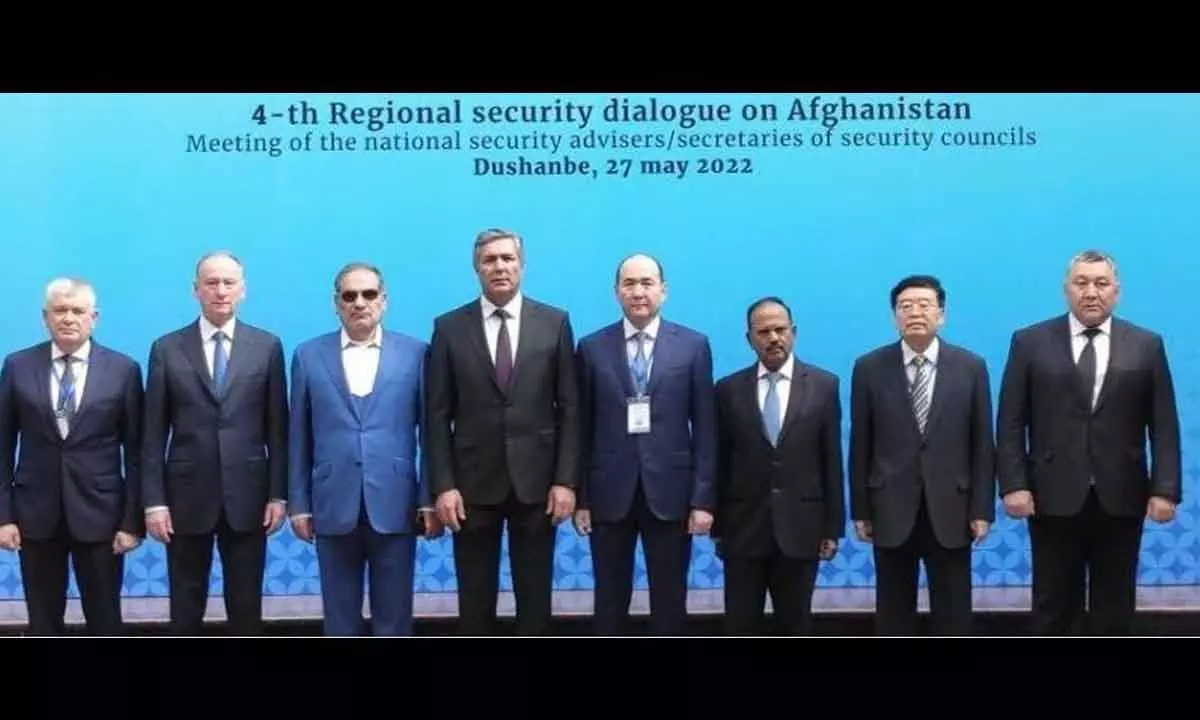World in a bind as hawks call shots in Afgan govt

No effect despite US unfreezing sovereign funds and some Islamic nations formally recognising them
The latest international conference ( Fourth Afghan Regional Security Dialogue ) to discuss the evolving situation in Afghanistan and also review the response of the neighbouring and regional countries to the latest Taliban decisions, took place in Dushanbe, Tajikistan, last week.
National Security Advisors (NSA) from Tajikistan, India, Russia, Kazakhstan, Uzbekistan, Iran, Kyrgyzstan and China, with Pakistan abstaining as it currently has no NSA, attended the Regional Security Dialogue on Afghanistan. It is believed that all the NSAs highlighted the need to find constructive ways to ensure peace and stability in Afghanistan and combating risks from terrorism emanating from the region and particularly ensure that Afghanistan doesn't become a terror hub again. This has been a primary concern for India since the Taliban took over the country, besides the rights of Afghan citizens, especially women and minorities. India has already closed down its diplomatic missions in Afghanistan, which the Taliban keenly wants to be reopened.
Ali Shamkhani, secretary of Iran's Supreme National Security Council (SNSC), said at the meeting that certain countries in the region and beyond were transferring Takfiri terrorists to Afghanistan, adding that terrorism and extremism are among the main causes of insecurity in Afghanistan.
Talibani Diktats
However, what concerns the international community more are the series of Taliban diktats on social issues, targeting women and specific Muslim sects in particular. On May 9, the Islamic Emirate of Afghanistan (IEA) ordered women and older girls to cover their faces when in public. The order further said that punishments for violating the decree would be inflicted on their male family members. Taliban leaders responded to public outcry by insisting that the decree is not mandatory, but so far their own enforcement efforts contradict those statements.
Further, on May 21, the IEA's Ministry of Vice and Virtue ordered all women television presenters to cover their faces, stating "the decision was final and that there was no room for discussion". Heather Barr of the Human Rights Watch described these new diktats as blatantly violating women's rights to freedom of expression, as well as personal autonomy and religious belief.
In response to the order, male presenters at several major news channels in Afghanistan started wearing face masks on air in solidarity with their female colleagues, an act that prompted the #FreeHerFace campaign on social media. As one women's rights activist wrote, "Afghan men showing up for Afghan women is not just a gesture. It's a turn in the story that will change everything. Brave brothers". This latest order is part of a steady flow of Taliban actions that have blocked girls' secondary education, pushed women out of most employment, curtailed women's freedom of movement, obstructed women's access to health care, and abolished the system designed to protect women and girls from violence.
They have gradually imposed more restrictions on Afghan women and Shia community. After banning them from acquiring certain government jobs, getting education, and travelling alone outside their cities, they have now ordered them to wear the burqa or to cover themselves from head to toe in public.
Taliban rationale
All these developments preplexe one to wonder as to why the Taliban-led IEA is hell bent on imposing those restrictions, which were introduced in its earlier stint also and to which they had vowed not to revert again.
It seems that Taliban have no intentions of transforming them into a modern-day political entity and change their views. In fact, they have slowly started implementing their real agenda, based on skewed political motives and controversial ideological beliefs.
Afghanistan of present might become a nation with contradictory notions of personal freedom as viewed by them in contrast to internationally recognised definition of personal freedom. They very well understand that international recognition will bind them to certain western norms and obligations, on human rights in particular, and as those would completely contradict their self-defined ideology or interpretation of Islam, they are ready to ignore it for the time being.
They might have thought that they would be able to deceive the international community by making shallow promises regarding female education and introducing an inclusive political structure. With US unfreezing their sovereign funds and after some key Islamic states formally recognised them, they would go about enforcing their actual agenda.
The international observers' hope was that the members of the Afghan delegation based in Doha might be able to influence their counterparts in Afghanistan, to follow the international demands. But in reality these moderate elements were sidelined in the new government and the hawks amongst them took control based on their ideological beliefs. Justifying their initial actions, some supporters pointed that their conservative mindset would take time to adjust to global realities. But the truth is that they have even failed to address the security concerns of their immediate neighbours.
So far they have even been unable to control the militant Islamic organisations like IS-Khorasan, which is present in some key Afghan provinces. This inaction on their behalf gives goose bumps to their immediate and regional neighbours, both. Similarly, they have been unable to rein in Tehreek-i Taliban Pakistan, which in fact enjoys full support of the IEA regime.
The irony is that Taliban's supporters, who were sincerely ready to offer them a second chance are dismayed by the double meaning actions or inactions by the IEA, as it puts the future of a vast majority of common Afghani on the block and does not bode well for the country's future, besides pushing those supporters into a tight corner. (IANS)

